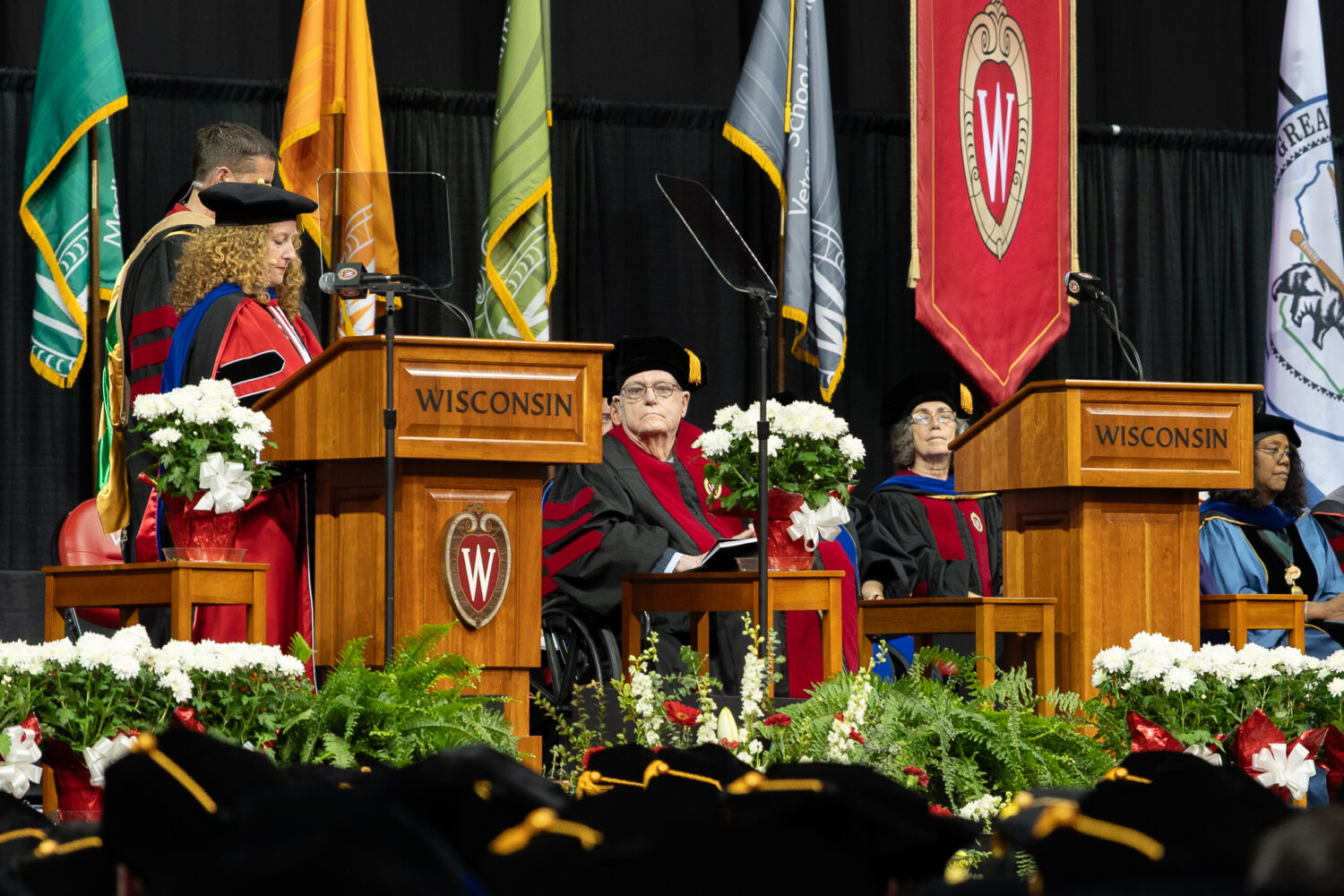
Shocked, disappointed, troubled, concerned, confused — all reactions to news of longtime Wisconsin politician Jim Sensenbrenner being rewarded with an honorary degree from the University of Wisconsin-Madison.
Sensenbrenner received an honorary degree from UW-Madison on May 9 during the Master’s and PhD graduation ceremony at the Kohl Center, 601 W. Dayton St. His career in the House of Representatives in Wisconsin’s 5th congressional district spanned from 1979-2021. In his long tenure, Sensenbrenner left a lasting legacy — one that has directly influenced the United States’ political stances on immigration.
Three distinct efforts from Sensenbrenner mark the weight of his career on the world. He is the politician behind the Patriot Act, REAL ID Act and 2005’s failed immigration reform bill.
“Unprecedented power to surveil and monitor Americans”
Following the events of 9/11, Sensenbrenner introduced the notorious Patriot Act, authored by former Assistant Attorney General and later Fox Chief Legal and Policy Officer Viet Dinh.
The act, which aimed “To deter and punish terrorist acts in the United States and around the world, to enhance law enforcement investigatory tools, and for other purposes,” the act states. Its results would affect the trajectory of civil liberties and U.S. foreign policy.
“The Patriot Act has given the state unprecedented power to surveil and monitor Americans without justification. The law gave the government the green light to spy on its own residents en masse, leading to the widespread profiling of communities based on race, religion, ethnicity and political association,” said David Gwidt, deputy communications director of the American Civil Liberties Union (ACLU) of Wisconsin, in a statement to Madison365.
The ACLU does not have a position on Senesenbrenner’s recognition, but it has taken a stance against the loss of civil liberties from his actions. It notes that the Patriot Act has allowed intelligence agencies to collect “massive amounts of Americans’ private information and data… without a judicial warrant”
The ACLU does point out the mass collection of data, but Sensenbrenner has also taken a stance against the way intellligence agencies have applied the Patriot Act. He has written multiple opinion pieces for outlets like The Hill stating he is against the National Security Agency using the Patriot Act to bulk collect data from citizens.
Regardless of the regret Sensenbrenner has imparted over the use of the Patriot Act, he has continued to be steadfast in the anti-immigrant aspects.
Sensenbrenner didn’t stop with the Patriot Act. Other efforts in his career include H.R. 4437 — the notorious immigration reform act from 2005.
The bill, better known as the “Border Protection, Antiterrorism and Illegal Immigration Control Act of 2005,” looked to completely overhaul the U.S.’s immigration policy.
The act consisted of: increased border security using ground-based sensors, satellites, radar coverage, camera and the use of unmanned aerial vehicles; more physical infrastructure along the border; increase of border personnel; making any undocumented immigrant in the U.S. subject to a felony charge; criminalizing anyone who would assist undocumented immigrants such as employers, churches or legal counsel; enhanced criminal penalties for immigration related crimes; expanded grounds for deportation; and a mandatory program that would require employers to verify employees’ work eligibility with the federal government.
The act passed in the House of Representantves but not the Senate and ultimately was never adopted.
“Quite honestly troubling”

Dr. Armando Ibarra, a professor at UW-Madison, remembers the protests over the bill and rise of social movements vividly. At the time, Ibarra was living in southern California.
“In 2006, millions of us took to the streets to demand that to kill this bill that was introduced by Jim Sensenbrenner that would criminalize immigrants and those that would help,” Ibarra said at the Wisconsin Conference on Latino Arts and Culture during his lunch address on art and activism. “In no other single time in my life have I felt like I was a threat to the state.”
Ibarra brought the subject to the attention of Madison365 at the conference. The conductor of immeasurable pain and loss, the root cause of seemingly unending strife for people of color through decades of anti-immigrant policy, was going to be awarded.
Ibarra credited Sensenbrenner as the “impetus for the modern-day immigrant rights social movement” in a later discussion with Madison365. He notes that the decision to honor Sensenbrenner with an honorary degree raised many eyebrows among his colleagues.
“I think it’s fair to ask the question ‘Why?’” Ibarra said. “If these folks truly embody this idea of the Wisconsin Idea, then what is that practice and what does that say about our cultural responsibility as a state?”
The sentiment is shared by other academics like Dr. Sergio Gonzalez, a UW-Madison alum and professor at Marquette University.

“I found it really surprising and quite honestly troubling to see that the university was bestowing this really important honor on Jim Sensenbrenner, particularly in this political moment that we’re in right now. I don’t think we can talk about 2025 without talking about Jim Sensenbrenner and his work,” Gonzalez said. “This is all very much a direct consequence of the work he did as an elected official.”
Sensenbrenner was Gonzalez’s representative growing up in the Milwaukee suburbs. It’s hard for Gonzalez not to think about him; Gonzalez’s office at Marquette is in a building named after Sensenbrenner’s great-grandfather, Frank Sensenbrenner.
Gonzalez also sits with Ibarra’s question — Why? What message does it send to communities of color? Gonzalez, much like Ibarra, can only offer his observations and assumptions on what that message may be.
“I think of these honors as an opportunity to elevate individuals who have done exemplary things for the state, not just for people who are quote-unquote important because they were in high positions of power,” Gonzalez said. “I think the university has an opportunity with these special commemorations to really elevate individuals in our state who perhaps are not the people that Wisconsinites might think of as being those most important figures, but who have also made substantial impacts. To me, the question was ‘Why bestow the honor on somebody who’s already received so many honors in life?’ There is the subjective question of whether or not he deserves it. And then the more objective question of asking, what’s the purpose of these types of commendations?”
The University of Wisconsin-Madison does have standards for who can receive an honorary degree and the process in which one is awarded. Sensenbrenner is also a graduate from its law school. When asked for a comment on Sensenbrenner receiving an honorary degree, the university provided its honorary degree policy.
Standards for an honorary degree are contingent on an external nomination that is voted on by the University of Wisconsin president, the chancellor, a faculty committee appointed by the Committee on Committee and the chancellor and US System president. It is then presented to the Faculty Senate where a three-fourths vote is required to approve each honorary degree.
An honorary degree is “one of the highest awards given by the university” for candidates that have shown “outstanding service to humanity globally, nationally or locally.” No current faculty, university or system employee, or elected official is eligible for recommendation for an honorary degree.
While Ibarra and Gonzalez grapple with whether Sensenbrenner is truly deserving of recognition from the university and what message it sends, the Center for American-Islamic Relations (CAIR) urged the university to think about the harm it causes.
“CAIR-Chicago respects UW-Madison’s decision, but honoring Rep. Sensenbrenner overlooks the deep harm caused by key legislation he championed—such as the PATRIOT Act, the REAL ID Act, and H.R. 4437,” CAIR-Chicago said in a statement to Madison365. “These laws raised serious civil liberties concerns, fueling surveillance, discrimination, and fear in Chicago’s Muslim and immigrant communities. CAIR-Chicago actively opposed these efforts through advocacy, education, and mass mobilization—including our role in the 2006 immigrant rights marches. Any recognition of public service should account for the full impact of one’s legislative legacy.”
The organization has frequently called out the acts Sensenbrenner has pushed in protests and press conferences. It has continuously issued statements on acts like H.R. 4437 and the REAL ID Act.
Madison365 attempted to contact Sensenbrenner at the graduation ceremony and via an unverified email address. Sensenbrenner could not be reached for comment.



